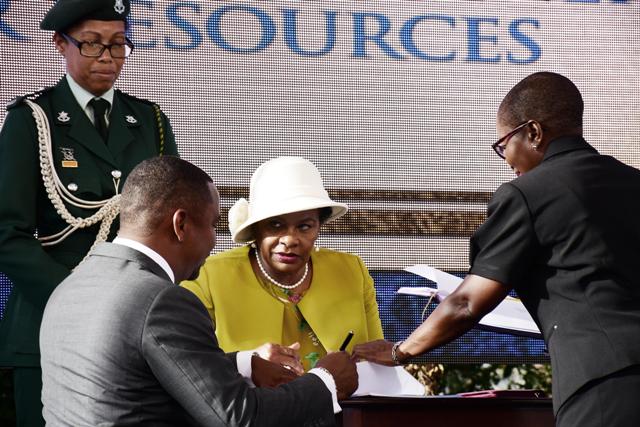 From 1 December, Governor General of Barbados Dame Sandra Mason will be the first president of Barbados. [photo: Alamy]
From 1 December, Governor General of Barbados Dame Sandra Mason will be the first president of Barbados. [photo: Alamy]
[This is an excerpt from an article in The Round Table: The Commonwealth Journal of International Affairs. Opinions expressed in articles do not reflect the opinion of the editorial board.]
Constitutional reform is not child’s play and shrinking violets will certainly not tackle the major institutional issues confronting the governance system in Barbados. From the outset it is clear that instead of what ideally ought to be a major governance issue, the government of Barbados is limited to merely seeking to swap one ceremonial head of state with another, as hinted by the terms of reference of the RSTAC, which is to ‘recommend the constitutional requirements necessary to effect the change [to a Republic] and to recommend the type of Presidency, the powers and tenure of the President, and to determine the ceremonial and legal implications of the Presidential status’. This means that, the change to a republic is unlikely to be accompanied by the necessary reforms, for example, around the powers of the prime minister, the type of voting system, nature of the legislature and the role of government, to tackle the institutional and cultural malaise in the constitutional and political fabric of the nation. The RSTAC, despite how it is dressed up, looks more to be about amending the constitution, while keeping the status quo, than changing the constitution which requires considering a different form and type of constitutional, political and legal system.
Absent from the renewed approach to republicanism in Barbados is the need to ensure that the process is plebiscite-driven and backed by popular support via a referendum. Instead, Barbadians are confronted with a Committee, cobbled together to give the impression of representativeness of its membership without the critical expertise required on such complex political and legal issues. The Chair of the RSTAC, Dr Marion Williams, confirmed this point by stating that ‘We are not making a decision. The decision has been made already. Over the years several Prime Ministers have confirmed that this is what they want, but somehow, we never actually made the last step. And the last step is the one that actually brings the constitution home to Barbados so that our Parliament in Barbados would now be responsible for the Constitution by which we are run’. This statement demonstrates a novice approach to understanding the Barbados constitution and issue of patriating, because since independence in 1966, the Barbados Parliament has been responsible for the Constitution, and in fact some scholars would argue that Barbados has been a republic since then, if we understand a republic to simply mean limited government by the rule of law.
Therefore, the Committee appears to show that seeming representativeness has been substituted for substance, all the more worrisome when there is patchy coverage of the subject by traditional media, a deafening silence from political and economic elites, the absence of a modicum of a social movement around republicanism and disinterest among a youth disengaged from traditional politics.
What however is apparent is that Barbados will move inexorably to republican status but with the status quo remaining, and with the symbolic change associated with the national head of state both practically and theoretically representing the citizens and not theoretically a foreign head of state. The real issue is therefore not about whether Barbados becomes a republic, or whether the Constitution is patriated, but about the relationship between the people and the Government as articulated in the Constitution. Is Barbados going to change its Constitution or be content with tinkering around the edges, masquerading as change?
Ronnie R. F. Yearwood is a Lecturer in Law, University of the West Indies, Cave Hill Campus, Barbados and Cynthia Barrow-Giles is a Senior Lecturer in Political Science, University of the West Indies, Cave Hill Campus.



